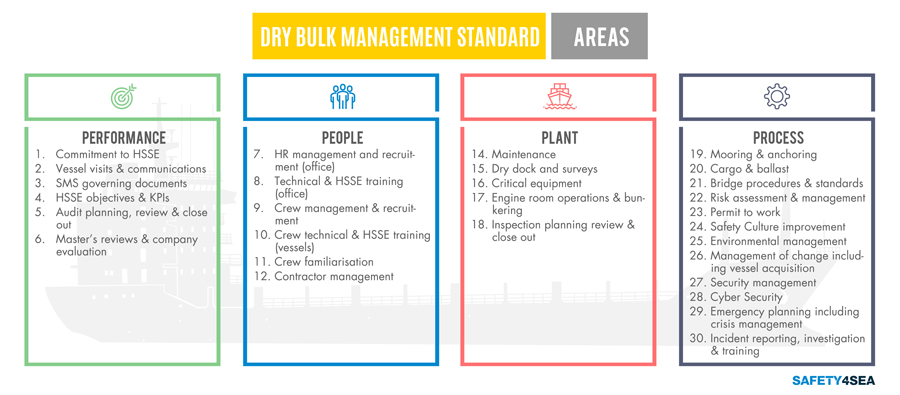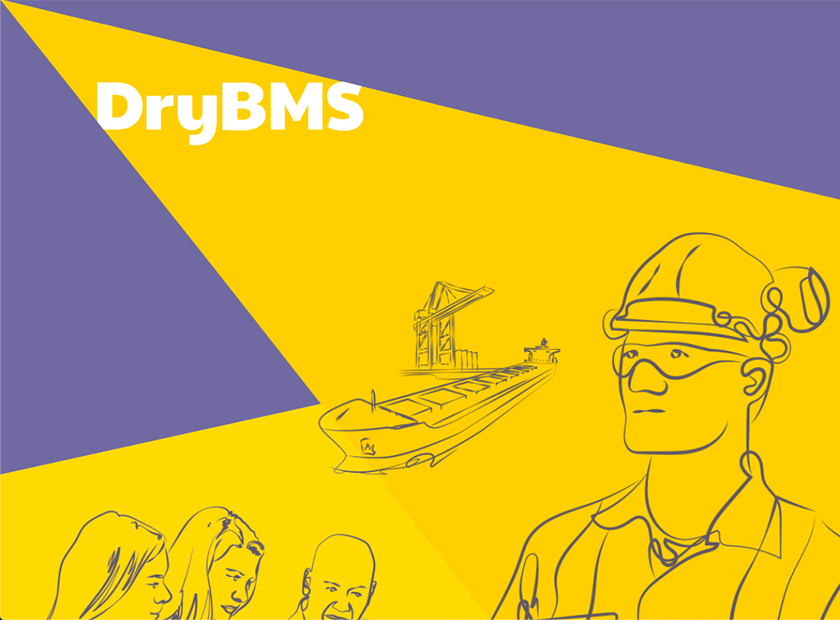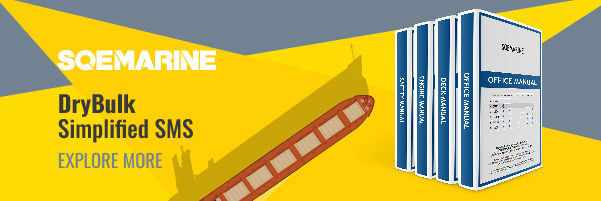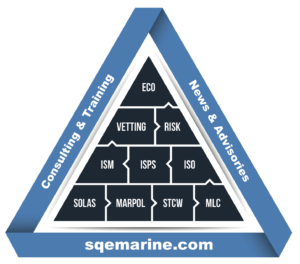The New DryBulk Vetting regime includes a new DryBMS standard, a crew welfare self-assessment tool and a new Rightship Inspection Ship Questionnaire (RISQ).
The DryBMS (Dry Bulk Management Standard)
At the beginning of January 2021, RightShip and INTERCARGO launched DryBMS which is a new quality standard for the dry bulk sector. The standard will be governed by a new NGO to be established later this year and will support the improvement of safety in the dry bulk segment.
During August 2020 both organizations combined their expertise to create a single framework for the whole industry. Supported by the International Chamber of Shipping (ICS) and BIMCO, DryBMS now exists as a simple set of best practices and key performance indicators with the aim to raise the bar on safety, environmental and operational excellence.
In particular, the DryBMS is an independent standard for the dry bulk shipping sector and its voluntary use and reporting, has no influence on the risk rating issued by Rightship’s star system. The final draft is still open for feedback. Anyone interested in reviewing the standard in its present form can visit the DryBMS website and provide any feedback to [email protected].
Structure of DryBMS
DryBMS is a voluntary standard that prioritizes improvement in standards in the dry bulk marine sector. This voluntary program is designed to allow ship managers to measure their Safety Management System (SMS) against agreed industry standards, with the aim of improving fleet performance and risk management. This will ensure an operator’s policies align with industry best practice to both advance their performance and attain high standards of health, safety, security and pollution prevention.
Guidelines focus on 30 areas of management practice across four important risk areas in vessel operations; performance, people, plant and process. DryBMS will grade the excellence of a company’s SMS against measurable expectations and targets without involving the burdens of excessive inspections.

Each area can be completed to one of four levels:
- Basic
- Intermediate
- Advanced
- Excellence
By assessing their management systems against voluntary standards and carrying out continual improvement to meet the higher stages, companies can help improve their safety performance – and that of the industry’s performance as a whole.
The standard identifies 17 priority subject areas that are considered to have the greatest impact on safety, environment and operational efficiency. If companies have sufficient resources, they should self-assess all 30 subject areas; however recognizing that some smaller companies may find it difficult to tackle all areas, it is suggested to start focusing on the priority areas before moving on to the rest in due course.
The identified priority Subject Areas are:
| Performance | People | Plant | Process |
| 1. Commitment to HSSE 6. Master’s reviews & company evaluation |
7. HR management and recruitment (office) 9. Crew management & recruitment 10. Crew technical & HSSE training (vessels) 12. Contractor management |
14. Maintenance 19. Mooring & anchoring 16. Critical equipment 17. Engine room operations & bunkering |
20. Cargo & ballast 21. Bridge procedures & standards 22. Risk assessment & management 23. Permit to work 26. Management of change including |
Rightship New Expanded Inspection Ship Questionnaire (RISQ)
Rightship introduced the Rightship Expanded Inspection Ship Questionnaire (RISQ) in May 2021, along with extended guidance as an upgrade to the previous inspection regime, to be implemented from Q4 of 2022 onwards. Within this new inspection regime major changes have been introduced, including but not limited to the following :
- Integration and referencing to the Dry Bulk Management Standard (DryBMS).
- Integration of OCIMF’ MEG-4 standard based on “Mooring Equipment Guidelines”, 4th Edition, similar to the Tanker standards, along with procedures for the inspection, maintenance and wear zone management of the mooring lines.
- Enhanced requirements for ECDIS procedures.
- Enhanced permit to work system and Lock-Out/Tag-Out (LOTO) requirements
- Requirement for adequate policies on crew welfare and mental health
- Requirement for unannounced drug testing by external agency, similar to the Tanker industry requirements
- Requirement for Computer-Based Planned Maintenance System.
Rightship Crew Welfare Self-Assessment Tool
Rightship introduced the Crew Welfare Self-Assessment Tool in October 2021, as a project led by the Sustainable Shipping Initiative (SSI) and the Institute for Human Rights and Business (IHRB), in collaboration with the Rafto Foundation for Human Rights and RightShip to support a safe, healthy and secure onboard work environment, that goes beyond ILO Maritime Labour Convention (MLC) to focus on the full spectrum of seafarers’ rights and wellbeing, from fair terms of employment and minimum crewing levels to the management of grievance mechanisms.
The new Crew Welfare Self-Assessment Tool includes requirements for Shipowner and ship operator to :
- Commit to valuing seafarers and respecting their human rights, including written policies and documented procedures, supported by appropriate staffing, to manage compliance with MLC, other relevant health and safety requirements and the Rightship Code
- Inform and train seafarers (including officers and ratings) and other staff on seafarers’ rights and commit to an inclusive workforce
- Promote an inclusive working culture through leadership, training and mentoring to support open communications and improve morale and working relationships on board and with staff on shore.
- Commit to equal opportunities in recruitment, hiring, placement, development, promotion, terms and conditions of employment and benefits, recognizing underrepresented groups in the industry.
- Ensure a workplace free from discrimination, harassment, violence or retaliation of any kind.
The new Crew Welfare Self-Assessment is providing three (3) levels of compliance:
- Basic: Achieving the basic level requires meeting all requirements for the basic level.
- Intermediate: Achieving the intermediate level requires meeting all requirements for the basic and intermediate levels.
- Excellent: Achieving the excellent level requires meeting all requirements for the basic, intermediate and excellent level.
How SQE Marine may be of assistance
- Management of Change Assessment
- Gap Analysis of the SMS against DryBMS, Rightship Inspection Ship Questionnaire (RISQ) and Rightship Crew Welfare Self-Assessment Tool
- SMS Update to the new additional requirements
- New Simplified SMS, fully streamlined to properly integrate the new requirements
- Management Briefings and Office Staff training
- Crew Awareness and Training sessions
- Fleet Awareness Campaigns aligning with company plans
- DryBMS: A new standard to drive the market (Panel Discussion)
- DryBMS: A new safety standard for dry bulk sector
- RightShip launches new dry bulk inspection questionnaire
- DBMS represents the next phase of a journey towards safety
- Enhancing dry bulk safety: Key things to watch (Panel Discussion)
- Code of Conduct to protect seafarers rights and welfare launched
- Additional resources about RightShip



